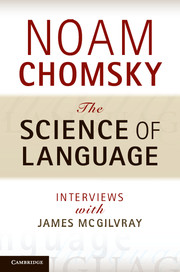Book contents
- Frontmatter
- Contents
- Introduction
- Part I The science of language and mind
- 1 Language, function, communication: language and the use of language
- 2 On a formal theory of language and its accommodation to biology; the distinctive nature of human concepts
- 3 Representation and computation
- 4 More on human concepts
- 5 Reflections on the study of language
- 6 Parameters, canalization, innateness, Universal Grammar
- 7 Development, master/control genes, etc.
- 8 Perfection and design (interview 20 January 2009)
- 9 Universal Grammar and simplicity
- 10 On the intellectual ailments of some scientists
- 11 The place of language in the mind
- 12 Chomsky's intellectual contributions
- 13 Simplicity and its role in Chomsky's work
- 14 Chomsky and Nelson Goodman
- Part II Human nature and its study
- Appendices
- Commentaries
- Glossary
- Bibliography
- Index
3 - Representation and computation
from Part I - The science of language and mind
Published online by Cambridge University Press: 05 June 2012
- Frontmatter
- Contents
- Introduction
- Part I The science of language and mind
- 1 Language, function, communication: language and the use of language
- 2 On a formal theory of language and its accommodation to biology; the distinctive nature of human concepts
- 3 Representation and computation
- 4 More on human concepts
- 5 Reflections on the study of language
- 6 Parameters, canalization, innateness, Universal Grammar
- 7 Development, master/control genes, etc.
- 8 Perfection and design (interview 20 January 2009)
- 9 Universal Grammar and simplicity
- 10 On the intellectual ailments of some scientists
- 11 The place of language in the mind
- 12 Chomsky's intellectual contributions
- 13 Simplicity and its role in Chomsky's work
- 14 Chomsky and Nelson Goodman
- Part II Human nature and its study
- Appendices
- Commentaries
- Glossary
- Bibliography
- Index
Summary
JM: Continuing in the same vein, your understanding of computation seems to differ from the philosophically favored notion where it is understood as tied in with a representational theory of mind. Computation there is understood to be something like the operations of a problem-solving device that operates over symbols understood in traditional (not your) semantic terms, in terms of relationships of items inside the head that represent things outside in the world.
NC: The term “representation” is used in a kind of technical sense in the philosophical literature which I think basically comes back to the theory of ideas. You know there's something out there and the impression of it becomes an idea, and then there's a relation – so, say, in Jerry Fodor's representational theory of mind – there's a causal relation between the cat over there and the concept cat in your language of thought. And Kripke, Putnam, Burge have a picture roughly like that.
JM: Well, it's more than just causal – I mean, for Fodor, it really is a semantic relationship . . .
NC: Yes, but it is causal [in that something ‘out there’ causes the formation of an internal representation which is your ‘idea of’ what causes it]. I mean, that's how you get the connection. There is some causal relation, and then, yes, it sets up the semantic relation of reference. And there is a factual question as to whether any of that happens. Obviously there's some causal relation between what's outside in the world and what's in our head. But it does not follow that there's a symbol–object relationship, [something like the reverse of the causal one]. And the big problem with that approach is – what's the object? Well, here we're back to studying lexical concepts and it was pretty clear by the seventeenth and eighteenth centuries that there wasn't going to be a relation like that, even for the simplest concepts. We just individuate things in different ways.
Locke's discussion of personal identity is a famous example of how we just don't individuate things that way; [we, or rather, our minds, produce the concept PERSON]. That goes back to Aristotle and form and matter, but then it's very much extended in the seventeenth century; and then it kind of dropped. As far as I know, after Hume it virtually disappears from the literature. And now – these days – we're back to a kind of neo-scholastic picture of word–thing relations. That's why you have books called Word and Object [by W.V.O. Quine] and that sort of thing. But there's no reason to believe that that relation exists. So yes, the representational theories of mind are bound to a concept of representation that has historical origins but has no particular merits as far as I know.
- Type
- Chapter
- Information
- The Science of LanguageInterviews with James McGilvray, pp. 31 - 32Publisher: Cambridge University PressPrint publication year: 2012



